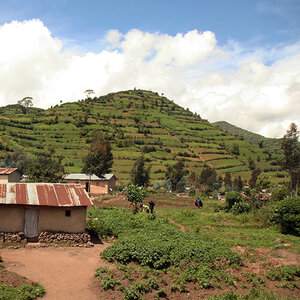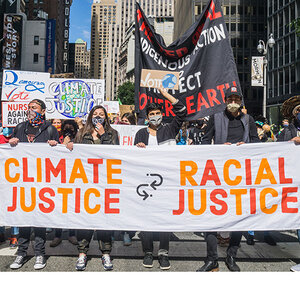Paula DiPerna, Special Advisor, CDP North America: If we believe the climate science...almost every job is a green job
October 29, 2021
Author Paula DiPerna is a strategic global environmental and philanthropic policy advisor who has consulted with numerous environmentally focused nonprofit organizations, including WorkingNation, with which she is collaborating on a report that examines green jobs potential and workforce needs. She also serves currently as special advisor for CDP North America, and previously served as president of the Joyce Foundation, president of the Chicago Climate Exchange, and vice president for international affairs at the Cousteau Society. DiPerna founded the Jobs and Environment Initiative, which examined how public policy on economic development and environmental conservation could work more closely together to generate employment and livelihoods in all the regions of the U.S.
PND spoke with DiPerna about green job markets, diversity, and how growth in green jobs could affect the U.S. and global economies.
Philanthropy News Digest: Where are the green jobs in the United States currently, and how is that market changing?
Paula DiPerna: First we must define what is a green job. Most of the world, including philanthropy and the environmental movement, have not agreed on a basic point: If we believe the climate science, if we believe that water efficiency and energy efficiency are essential, and if we believe that infrastructure improvement is essential, then almost every job is a green job.
You cannot redo, recreate, and redesign the global economy without environmental considerations any longer. In that sense, the plumber, the electrician, the drywall installer — all these jobs will eventually be considered green. Which means it's impossible to talk about the scale without talking about a redefinition.
If we believe the climate science, if we believe that water efficiency and energy efficiency are essential, and if we believe that infrastructure improvement is essential, then almost every job is a green job.
PND: That would require a mindset change for the global economy.
PD: It is a mindset change. And it's already happening. For example, look at financial advisors. A few years ago, one in nine dollars invested in the United States was screened for environmental or social considerations; today, it's one in three dollars. Right there, you can see that where capital is going is influenced by environmental factors.
As I say, if you believe the climate science and if you believe energy efficiencies are essential to business and profit-making, then there is significant incentive to actually implement that greening. You eventually end up with everybody focused on environmental improvements.
Of course, there are direct jobs like someone who puts a solar panel on a roof. It turns out, you don't need a whole lot of special training to do that other than in the handling. Any builder could do it with just a little extra training on how to space them and how to connect them, for example, but it's not a specialty job per se.
It is a change in mindset, as you said. If we were able to make that change in mindset, it would be transformational in terms of the labor market, job availability, and so on. I've been at this a while, and I don't understand why it's been so hard to put jobs creation at the center of environmental policies
That being said, politicians promoting the Green New Deal have talked about creating eighteen million new jobs; the Biden administration is talking about new jobs. As to how many jobs, I think it all depends on how you define a green job.
PND: So, there's no specific background per se that's necessary for people to work in those areas. Those areas are coming to them.
PD: Well, there are specialty certifications that are required, but generally speaking, you can overlay a specific certification or specialty training on many jobs to get the green benefit from that job. To offer a highly simplistic example, if 30 percent of the water in the country is leaking, plumbers would come in to fix those leaks. Are those green jobs? It is in my sense of the word, because we can never have too much efficiency with water, and if it's tied to some sort of specific green initiative, it would most likely be considered a green job. Now, let's say there was a state policy that said, "In this community we're going to fix all the leaks and we're doing it in order to meet X goal of water efficiency," it would be more obvious that it was a green job.
PND: Earlier this year, WorkingNation received a grant from the Walton Family Foundation in support of the organization's ongoing study of green jobs. What parts of the country is that research focused on, and why were the studies focused on those areas? And what has been learned so far?
PD: The research is focused on the lower Mississippi basin, which faces serious environmental remediation and resilience challenges, especially concerning clean-up of waste sites, flooding, wetlands restoration etc. The WN research is underway now, and it will be looking at what jobs and skill sets exist — or can be added — in order to meet these environmental challenges, and how environmental needs and workforce skills can be best matched.
PND: How diverse is the green market, and what is necessary to ensure that more underrepresented populations can enter what appears to be a growing field?
This is the greatest opportunity to develop jobs in a generation. It's an opportunity to reindustrialize and recreate and redesign and redo and rebuild and retrofit everything.
PD: Diversity is the key to everything. I believe that eventually all jobs will be focused on some form of environmental improvement. This is the greatest opportunity to develop jobs in a generation. It's an opportunity to reindustrialize and recreate and redesign and redo and rebuild and retrofit everything.
I don't know that there's any more or less diversity in the green job force today as compared to other workforces. We did a podcast recently with a group in West Harlem called the West Harlem Environmental Action Team. They have a program that trains people how to install solar panels on various co-op apartments in Harlem. They've created a co-op to go after contracts. That's mostly an African-American workforce. So, it depends on where you are; it depends on the incentives; it depends on the programs.
But if we were to link jobs creation programs and economic development programs with environmental improvement programs, you'd have the greatest jobs bonanza in a hundred years. It's as critical as the original industrial revolution. This is a re-industrial revolution.
You've seen with Hurricane Ida the pressure to build in more climate resiliency to infrastructure projects. Those are essentially building jobs, but if you tie them to climate resiliency, you have to call them a green job.
PND: What effects might the infrastructure bills pending in Congress and other federal funding have on addressing infrastructure needs from a green standpoint?
PD: There is no substitute for significant upfront funding to advance the environmental agenda, which has been seen as marginal to the economy and to people's lives — almost since inception. But the reality of climate change has shown that the environment is not marginal to anything; it's essential. If you put that at the center of your budgeting and the center of your thinking, it can have a significant stimulus and ripple effect.
For example, after the government put money into the international highway system, look what you have! We put money into going to the moon; we got there. A centralized, focused approach tends to work best. Fragmentation doesn't seem to work. That's not to say that state policies aren't important, but a significant federal statement would be very important in terms of maximizing the benefits of those dollars in terms of jobs creation.
PND: How about philanthropic dollars? It seems that few philanthropic efforts related to climate change and the environment are dealing with increasing diversity in green jobs markets. Where do you see opportunities for foundations to establish a new path in this area?
PD: I think the nitty gritty. Foundations can get involved in tracking actual jobs. But linking jobs creation and economic development programs with environmental improvement programs would be a significant contribution. Most foundations have programs that separate those two, but some interdepartmental programs that actually link philanthropic contributions to economic development with philanthropic contributions for environmental protection and environmental improvement would be significant.
In my experience in philanthropy, however, I know that that's a gap. In my work with green jobs, we're always trying to look at how much money is spent on so-called economic development and how little is tied to environmental protection. So, for example, when you're talking about protecting the Everglades, that's a goal, but why couldn't that be linked to training people to actually become geoscientists or water monitors in that field, proactively placing jobs creation as a priority?
I can't speak to any foundation's specific programs currently, but I know that linking economic development and environmental improvement would be transformational.
I'd like to emphasize that addressing environmental challenges is a significant economic and jobs creation opportunity. It's not a burden; it's an opportunity. You only have to look at what it cost to rebuild a city like New Orleans after Katrina or Houston after Harvey or New York City after Sandy. You only have to look at the rebuilding after one storm to see that preparedness and planning ahead would be very useful.
And if we grab that opportunity — if we address these environmental challenges — it would be the brass ring.
—Matt Sinclair







